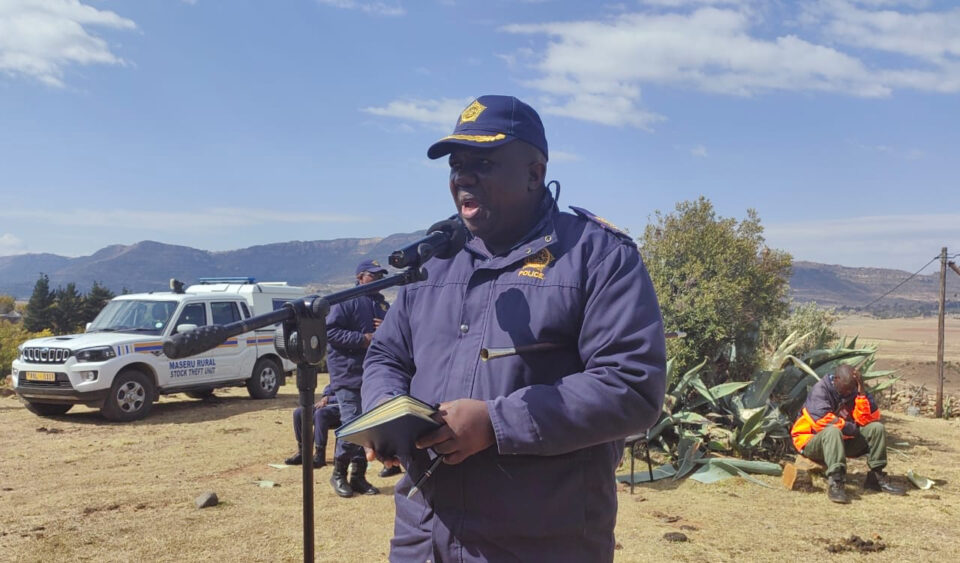Mathatisi Sebusi
THE Lesotho Mounted Police Service (LMPS) has dispatched a team to probe community concerns over a series of killings in Rothe ha Molungoa, where up to 25 people have been shot and killed between 2017 and 2025.
All the killings involved illegal firearms, leaving the community living in permanent fear.
In an effort to curb the violence, police officers from the Maseru district on Thursday visited the village to seek the cooperation of residents in helping apprehend the killers.
Maseru Rural District Commissioner, Assistant Commissioner of Police (ACP) Motsamai Kholumo, told residents that the decision to seek their partnership was prompted by the high rate of murder cases reported to his office.
He said many community members had fled the village fearing for their lives, leaving behind only those who had nowhere else to go.
ACP Kholumo said the village school, once attended by many children, had since closed after enrolment plummeted as parents withdrew their children over safety concerns.
“It is very wrong that this village has turned into a desert and people live in fear. We know that those who are still here are only here because they have no other options,” ACP Kholumo said.
“People have left their homes to rent rooms in Maseru out of fear for their lives. It is sad because some of you know the killers, yet you protect them. These killings are motivated by nothing but revenge. Please report crime and stop trying to take the law into your own hands. If we work together, we can reclaim this community and make it habitable again so that those who left can return freely.”
ACP Kholumo said it was particularly tragic that innocent women and children were often killed when attackers fail to find their intended targets.
“Why kill innocent women and children? Who kills women and girls, other than a coward? The other disturbing thing is that people encourage one another to take revenge when a family member is killed, which is illegal. Crime must be reported to the police so that the culprits can be arrested and face the courts of law.”
He claimed that some community members were protecting the killers because they were family members.
“I also know that some of them are present here today, and I want you to know that one day we will catch you, especially since one of you has already been arrested in Bloemfontein, South Africa. We know that others ran away after learning that they were wanted by the police.”
ACP Kholumo said all murder cases from the village were being treated seriously and that offenders will face severe punishment. He encouraged residents who had opened cases at Morija Police Station to follow up and request updates on their cases.
In an interview with the Sunday Express on the sidelines of the police meeting, Ha Molungoa Chief, Phamotse Chobokoane, said the killings began as a conflict between two families over cattle.
The violence later spread across the village, eventually overwhelming the entire community, as victims sought revenge on anyone responsible for killing their relatives.
“Now things are better because we are able to sleep in our houses. Years ago, before the Lesotho Defence Force started guarding the village and responding quickly to killings, men used to sleep in the mountains under rocks while women sought refuge in a neighbouring village, only returning home during daylight hours.
“We are still living in this village because we have nowhere else to go. We have no money to rent rooms or buy land in other villages. All these years we have been living in fear, waiting for our deaths, because there was nothing we could do,” Mr Chobokoane said.
He explained that the violence escalated as community members began recruiting friends to help kill others, including innocent children and women.
“They even killed five children and their grandfather, who was their caregiver. When they do not find their intended target, they kill anyone available,” he said.
Also speaking to the Sunday Express, a villager, Mathabang Chobokoane, described living in Ha Molungoa as a traumatising experience, particularly for women. She confirmed that the situation had improved compared to four years ago.
“During the worst times, we were afraid to sleep in our homes because we were attacked daily and many were killed. We used to sleep in a nearby village and return home in fear every morning.
“Even during the day, we lived in constant fear. Drawing water from a community tap was a challenge because the attacks had escalated so much that shootings occurred even in broad daylight,” she said.

